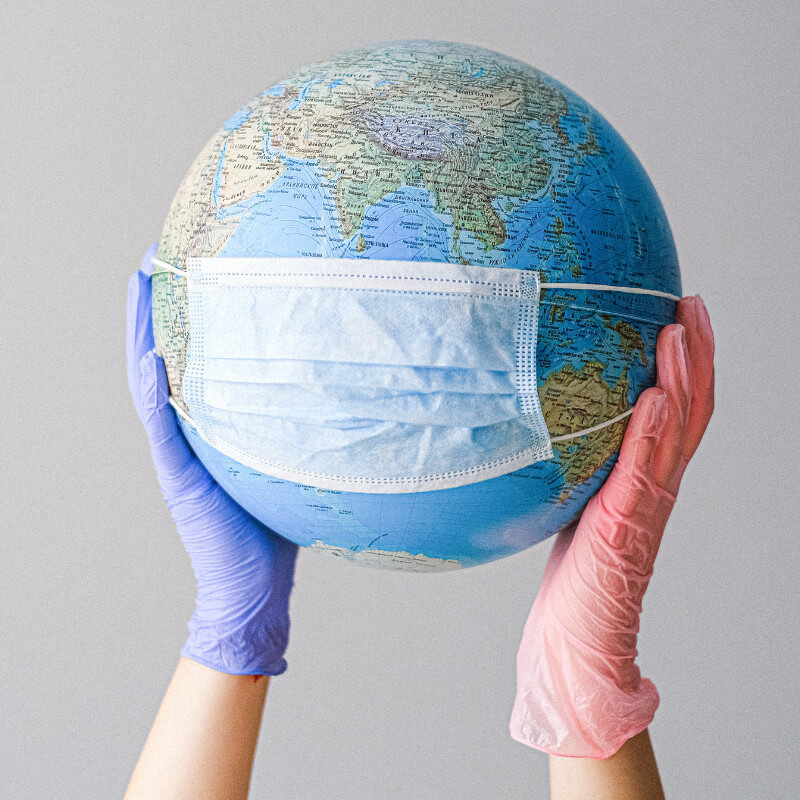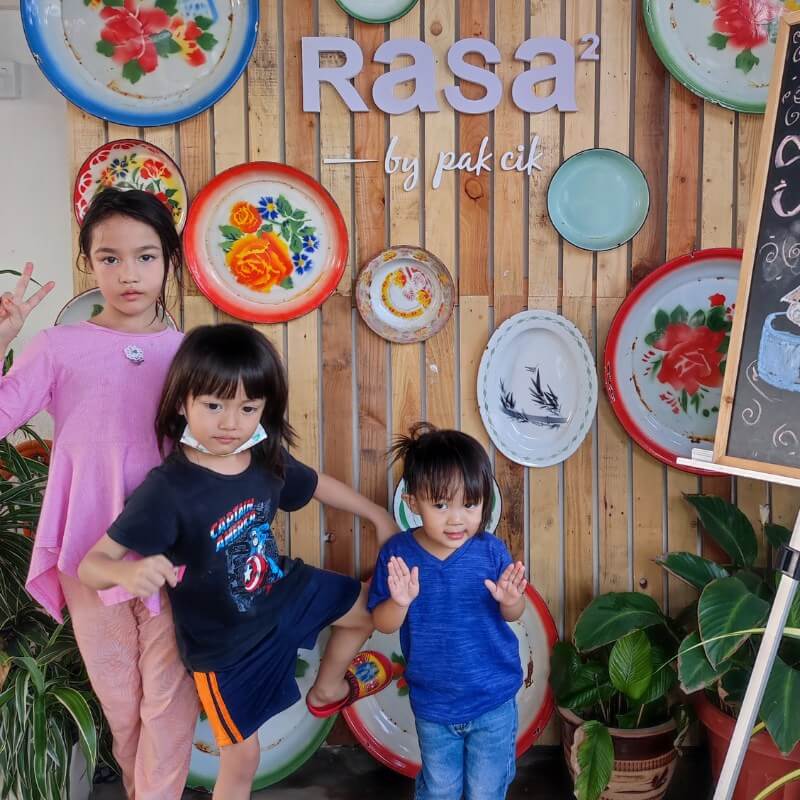Who would have thought two years ago that a global pandemic would break out, wreaking havoc around the globe and leading to the development of a new vaccine? Well, believe it or not, the COVID-19 viral outbreak has been circulating since late 2019 and it doesn’t seem to be going away anytime soon.

Nevertheless, each nation is working diligently to combat the situation as efficiently as possible to protect the community and reduce the spread of COVID-19. The safety measures may differ from country to country, but here in Malaysia, it is mandatory to wear masks when we’re out in public.
It has become something of an obligation to make sure everyone, especially the kids, wears their masks before going out. I have to always keep extra masks in my handbag and car because, you know, young children and masks just don’t go along together.
One minute the mask will be on the face, the next minute it’ll be below the chin or on the head, and before you know it, the mask will either end up on the ground or simply *poof* missing in action! Kids being kids, right?

The masking requirement, however, isn’t a big deal for most people, but one of the most serious concerns in combating the pandemic is, of course, the COVID-19 vaccination.
So, What’s So Worrying About the COVID-19 Vaccine?
Almost every day, I see people sharing information about the vaccine on social media and WhatsApp, especially now that Malaysia has made it available to children aged 5 to 11.
Some are good, some are bad, and some made me wonder, ‘How can that possibly sound real to people?’ Of course, as a parent with two young kids in that age range, I understand how concerned parents can be.
This is a new vaccination, as opposed to the usual ones that our children could receive from birth, and has been around for a long time. The first COVID-19 vaccine was only approved in August 2021, so it hasn’t even been a year!
Then again, the debate over vaccines has raged for decades, dating back to the first introduction of the vaccine in 1796, which was the small pox vaccine. That’s why when the COVID vaccine first came out, there were a lot of questions about it—many people are still doubting its efficacy even now.
Before we go any further in this post about vaccinating young children aged 5 to 11, I believe it is necessary to back up a little to understand what a vaccine is, how it works, and why it is so important.
What Exactly is Vaccine?
According to the Centres for Disease Control and Prevention (CDC), a vaccine is ‘a preparation that is used to stimulate the body’s immune response against diseases. Vaccines are usually administered through needle injections, but some can be administered by mouth or spray into the nose.’
From the definition alone, I can say that vaccines help our bodies build immunisation to help fight infections, and from my additional research on MedlinePlus’s site, I discovered that vaccines are used to protect against both viruses and bacteria.
As stated in MedlinePlus, vaccines are particularly significant since developing immunity through vaccination is safer than acquiring immunity through disease infection. Vaccines also protect individuals in your immediate vicinity through herd immunity (i.e., the idea that immunisations can aid in community health).
Why Is COVID-19 Vaccine Necessary and Important?
Just looking at the 3D illustration of the Coronavirus that causes the COVID-19 pandemic makes me feel a little trypophobic!
Joking apart, COVID-19 is caused by infection with a Novel Coronavirus known as SARS-CoV-2. Given that the disease is caused by a virus, it’s understandable why vaccination is required to develop immunity against COVID infection.
The CDC even confirmed that ‘getting vaccinated can lower your risk of getting and spreading the virus that causes COVID-19 and it helps protect you by creating an antibody response without you having to experience sickness’.
Honestly, when adults in Malaysia became eligible for the COVID vaccine, I didn’t give it much thought. I just went to get vaccinated, knowing that it was for my own protection and that I’d be able to deal with any side effects.
However, now that kids aged 5 to 11 can be vaccinated, I’m beginning to have a lot of questions: Is it safe enough for children? How would my kids react to the vaccine? Which vaccine will be administered? And so many more.
To find answers, I ‘activate’ my research mode and start gathering information from reliable sources. I used the facts and figures I found to decide whether or not to have my young children vaccinated.
Here Are 5 Factors I Considered Before Deciding to Vaccinate My Kids:
1. Own experience
Of course, one of the first things I looked at was our own experience. My husband and I both got vaccinated to protect ourselves, so why not vaccinate our children to protect them as well? I think about this a lot, especially since my kids go to school and we frequently bring them outdoors.
2. Feedback from closest connection
Since the United States was one of the first countries to offer the COVID vaccine to children between the ages of 5 and 11, I decided to ask my brother and his wife, who live in the United States, about their decision to vaccinate their boys.
They explained that they decided to vaccinate their 6- and 8-year-old boys to protect them from severe COVID-19 illness or possible illnesses after COVID.
In addition, their children have already been vaccinated against polio, rubella, chickenpox, measles, and other diseases, so they believe that the COVID -19 vaccination is just another vaccination that can be added to the list.
My two nephews received two doses of the Pfizer-BioNTech COVID vaccine. They only had soreness at the injection site as a side effect, which lasted only a few days.
I believe it is critical for everyone to understand that vaccination does not guarantee that you will never be affected, but it does reduce the severity of symptoms. As my nephew had already been vaccinated, when he tested positive, he only had mild symptoms (sore throat and cough) that lasted 2-3 days.
Their advice for parents out there:
Use credible sources, such as peer-reviewed research, for vaccine information. Most importantly, when deciding whether to vaccinate your children against COVID-19, rely on information from health and infectious disease experts rather than social media platforms.
3. Research only from reliable sources
The news and stories about the COVID vaccine are just plentiful out there. Even if you aren’t looking, you might come across them while scrolling through Facebook or in WhatsApp groups that you are a part of.
I found a lot of information, but one thing that stood out to me is that a lot of people are concerned that the COVID -19 vaccine was rushed, which leads to vaccine hesitancy.
Well, I did somehow presume that advanced science and technology would allow vaccines to be developed quickly. But I’m still curious about the other variables that could have played a role. So, here’s what I found on Healthline:
- Governments and corporations devote resources to the development of COVID-19 treatments and vaccines.
- Much research has been conducted on similar coronaviruses known as SARS and MERS.
- COVID-19 vaccine technologies currently in use are the result of decades of research and experience.
- Administrative logistics with regulatory agencies were pushed through to make COVID studies a priority.
- Vaccine researchers all across the world worked 24 hours a day, 7 days a week to put trials together, analyse data, and programme the ability to analyse data.
4. Latest figures from statistic
I’ve found several data points related to COVID-19 cases, but the one that stands out to me when deciding whether or not to get vaccinated is the death rate.
According to the graph above, the death rate among unvaccinated people is always higher. In my opinion, this could indicate that the vaccine is effective, as those who have been vaccinated are less likely to become infected, and if they do, it is unlikely to be a serious case.
I also explored the number of COVID cases involving young children in Malaysia. Since the pandemic hit the country, nearly 580,000 children aged 18 and below have been infected. This suggests that children are vulnerable to the virus, and given the high number of cases, I believe COVID vaccination is necessary to protect my children.
5. Updated information from relevant authority and organisation
I’ve learned not to accept any information received bluntly on social media or WhatsApp. Rather, I would go to the official websites of the relevant authority and organisation to find up-to-date information.
These are a few examples of websites,
- World Health Organisation (WHO)
- Official Page on COVID-19 by Ministry of Health (MOH) Malaysia
- U.S. Food & Drug Administration (FDA)
- Centres for Disease Control and Prevention
These five aspects were used to assist me in making the vaccination decision. For some people, this may not be sufficient; therefore, you should seek additional information and conduct your own research if necessary.
How I Registered My Kids on MySejahtera App
There are upsides and downsides to everything we do in life. The same is true for COVID-19 vaccination, but I personally believe the benefits outweigh the risks. After much deliberation, I have registered my kids for vaccines on the MySejahtera App.
The steps are as follows:
- Go to the ‘Home’ page of the app.
- Click on ‘COVID-19 Vaccination’.
- Click on ‘Add Vaccine Dependent’.
- Under the name of the kid that is eligible to vaccinate, click on ‘Add as vaccine dependent’.
- Choose ‘Yes, Proceed’ on the next page to confirm that you are authorised to manage the vaccination process for the chosen dependent.
- Make sure the details of your dependent are current and click on ‘Confirm’.
- Continue to answer questions and fill in details as requested in subsequent pages.
- Click ‘Submit’ until the end and a ‘Thank You’ page will appear.
- Check your ‘COVID-19 Vaccination’ page and make sure your kid(s) are listed.
- The waiting game begins.
I’ll now need to find a convenient time to explain and better prepare my children for the vaccination date. I’m sure I could tell you more about this experience in another post.
To Each Their Own
Everyone must have their way of determining what’s best for their children and what isn’t, right? At the end of the day, everyone is free to choose whether or not to vaccinate their young children.
What’s important now is to take care of yourself and your family, and keep an eye out for new COVID-19 updates. If you want to get the most current statistics and data on the COVID situation, two useful websites that you could check out: COVID19 Vaccine Tracker and COVIDNOW in Malaysia.
No matter your decision, make sure it’s the wisest one, fellow mummies!
Take care and stay safe, always.
Disclaimer: The information provided in this article is for informational purposes only and should not be considered as medical advice from Motherhood. For any health-related concerns, it is advisable to consult with a qualified healthcare professional or medical practitioner.
For more insightful stories and fun recipes, stay tuned to Motherhood Story!